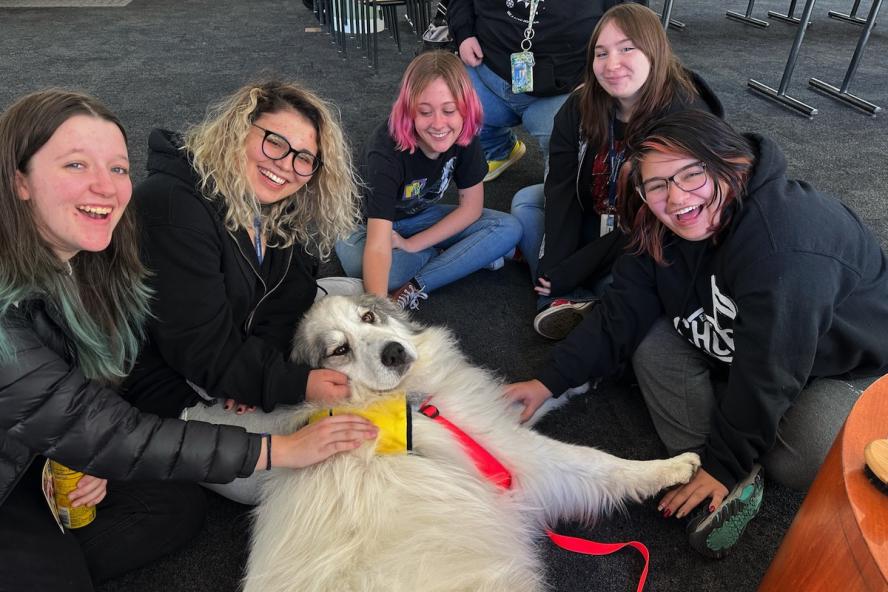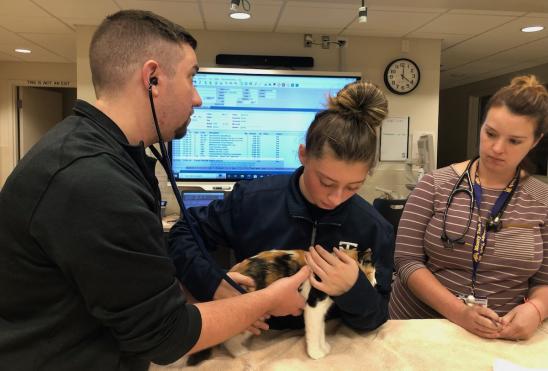-
About
- Leadership & Faculty
- News & Events
-
Academics
- Graduate
- Advanced Clinical Training
- Continuing Education
- Academic Departments
- Academic Offices
- Simulation Experiences
-
Student Life
- Offices
-
Research
-
Hospitals & Clinics
- Emergency Care
- Hospital Services
-
Community Outreach
- Volunteer
Standing on their Shoulders
Celebrating the altruism of Cummings School of Veterinary Medicine’s volunteers

Every day at Cummings School of Veterinary Medicine at Tufts University employees provide an outstanding level of customer service to support its students, clients, and partners throughout its classrooms, hospitals, and clinics.
The success of many endeavors also relies upon the dedicated work and generosity of volunteers. The significance of their contributions was amplified by the pandemic and reinvigorated upon their recent return. Through their example, a new generation of caregivers learns how to improve and promote the health and well-being of animals, people, and ecosystems we share.
Paws for People
Debra Gibbs (she/her), radiology rotation supervisor at Cummings School, co-coordinates Tufts Paws for People, for which volunteers provide 100% of the therapy animal team visits to local elder care facilities, hospitals, schools, and other sites.
“In addition to the visits, our volunteers help with the evaluation screenings for potential therapy animal teams, the renewing of teams, and supporting new members as they begin their visits,” says Gibbs.
More than 100 animal/handler teams are members of this core service program, which is part of the School’s Center for Animals and Public Policy and the Tufts Initiative for Human-Animal Interaction.
Clarisse Youmell (she/her) has been a Paws for People Pet Partner handler since 2006. “Badger Blue (a full blood great pyrenees) and I are my third therapy dog team and I believe my life would not be full without being a therapy dog team,” she explains, as they visit schools, libraries, community events and a homeless shelter for families with children.
“Badger Blue greets every person by looking them in the eyes, without my prompting,” she says. “He is so tall that he can be hugged, and I have seen countless people bury their faces in his fur, and weep."
He is the epitome of nonjudgmental compassion, and that is why we do what we do, making a small difference in the world, one person at a time. It’s what he does best, and he loves it.
Tufts at Tech
Sarina Selleck, V17 (she/her), an emergency doctor at Veterinary Emergency Group in Shrewsbury, Massachusetts, donates her time and expertise at Tufts at Tech Community Veterinary Clinic, where veterinarians provide low-cost care for family pets from local underserved communities.
“I volunteer at Tufts at Tech to offer mentorship to students while providing much needed veterinary care to the community,” Selleck says. “The rotation at Tufts at Tech is one of the first times many students take primary responsibility for cases. It is rewarding to empower students to think critically about cases, develop their own treatment plans, and to find solutions to overcome financial barriers for pets and their families.”
Jen Harackiewicz, V16 (she/her), is the veterinary medical director at Monty Tech Veterinary Clinic in Westminster, Massachusetts, a small animal general practice which provides a similar service to Tufts at Tech, where she also volunteers.
“Taking the lead and being the primary doctor on general practice cases and surgeries allowed me to hone my veterinary skills while gaining confidence,” says Harackiewicz. “This level of teaching in a real-life setting is unmatched."
Once I graduated, it was important to me to ‘pay it forward’ as a volunteer. It is so fulfilling to guide veterinary students as they move from student to doctors; from academia to real-life.
Dr. Greg Wolfus, V98 (he/him), a clinical associate professor in the Department of Clinical Sciences, directs Tufts at Tech. “Since inception, our veterinary volunteers have been a critical addition to our community clinic,” says Wolfus. “They support our D.V.M. students, share practical clinical tips and help to partner Tufts at Tech with our local veterinary community. While there has been a drop in volunteers during COVID, we are now staffed with volunteers about two out of every three clinical days, which helps us to care for more than 500 pets each month.”
Tufts Wildlife Clinic
Located on the Cummings School campus in Grafton, Tufts Wildlife Clinic is a reliable resource for wildlife information, a treatment center for more than 3,000 wild animals annually, and designated by the U.S. Fish and Wildlife Service as the regional facility to care for federally threatened and endangered species.
“When we had to suspend our volunteer program at the Wildlife Clinic at the outset of the COVID-19 pandemic, what we always knew to be true became very apparent—our dedicated team of volunteers is integral to the functioning of the Clinic,” says Dr. Maureen Murray, V03 (she/her), clinical associate professor in the Department of Infectious Disease and Global Health.
“Many of our pre-covid veteran volunteers are back in action here at the Clinic. We are more grateful than before for all their hard work, and we are more inspired by their commitment to contributing however they can to the well-being and conservation of our wildlife.”
Alumni Volunteers
Cummings School of Veterinary Medicine also benefits greatly from the generosity of numerous alumni who donate their time, expertise, and financial support to assist its students, faculty, staff, and community partners.
Devoted graduates serve Cummings School in various capacities, such as K–12 and professional veterinary outreach; advising and teaching options; and a 30-minute mentor program. “The 30-minute mentor program offers a really unique way for students and alumni to connect,” says Rachel Kanefsy, V24 (she/her), a program participant. “ The program is being revamped to improve students’ accessibility to it and ease maintenance of the mentor database. Students will have access to information on all mentors and can reach out to any that fit their interests, whether it’s professional development-related or personal.”
Alumni also help in the admissions process through alumni panels for prospective students, according to Director of Admissions Rebecca Russo (she/her). “We host these panels a few times a year and ask four or five alumni from various career paths to join,” she says. “Our summer program, Adventures in Veterinary Medicine, also hosts alumni panels for participants. These are popular and an easy way for alumni to contribute.”
To learn more, visit alumni volunteer opportunities.
